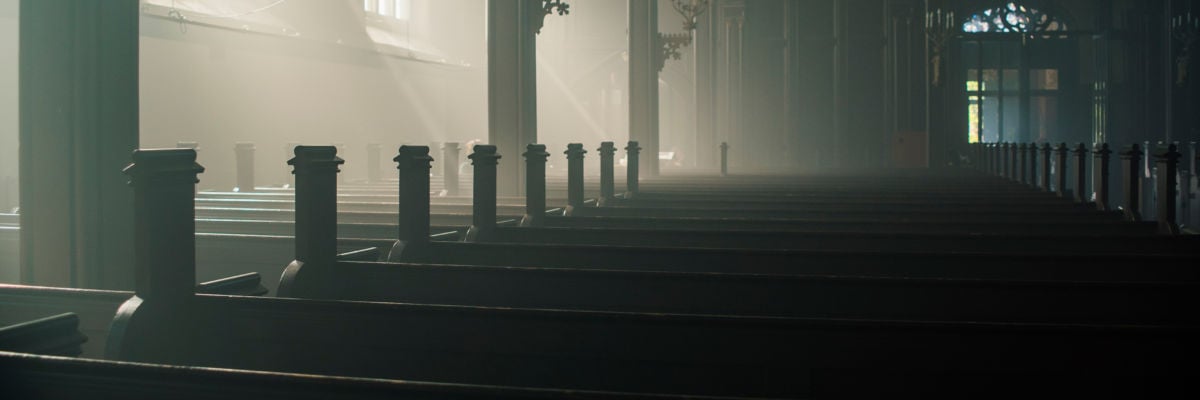
For several decades now, our culture has associated Christianity, and especially traditional, creedal, Catholic Christianity, with “family values.” This association cuts across the Catholic/Protestant divide, and the idea is further tangled up in American political identity and modern disputes about the direction of liberal society.
Back when I was growing up in the eighties and nineties, there was “Focus on the Family” in the evangelical world. Now we have a variety organizations attempting to promote what they see as authentic human and social virtue amid the increasingly hostile secular space, where pride, pleasure, and personal autonomy have emerged as the lone permitted path to peace and happiness. Whether the shrill voices on the so-called left and right are anything more than noise, we can certainly understand the basic problems that go with a culture seems intent to untether itself from basic human realities, which we would call natural law. The natural human family—the natural relationships among fathers, mothers, and children—does in many places seem lost to the competing vision of human life as merely the quest to do whatever we happen to want, to be whatever we want to be, and to employ science and technology as unregulated tools to accomplish those arbitrary ends.
So if we have been accustomed to a certain role in that culture war, as Catholics who defend the moral principle behind the Fourth Commandment—honor your father and mother—against these hostile forces, it can come as a shock to recall the Lord’s hard words here in Luke 12:
Do you think that I have come to give peace on earth? No, I tell you, but rather division; for henceforth in one house there will be five divided, three against two and two against three; they will be divided, father against son and son against father, mother against daughter and daughter against her mother, mother-in-law against her daughter-in-law and daughter-in-law against her mother-in-law.
Perhaps at the moment, having experienced such divisions in real time, the words did not come across quite as shocking. But we have to read these in the aftermath of the many declarations of the Lord’s peace, especially after his resurrection! Isn’t he the Prince of Peace? Doesn’t he say, in the upper room, “Peace be with you”?
These are contradictory only if you take for granted that there is only one kind of peace. But the Lord does clue us in here. Before his passion, Jesus says to his disciples in John’s Gospel, words echoed quietly by the priest at every Mass, “Peace I leave with you; my peace I give to you; not as the world gives do I give to you” (John 14:27).
Not as the world gives. What does that mean? The world’s “peace” could be the temporary end to conflict. It could mean compromise between opposing forces. It could be the peace imposed and protected by a victorious army. It is external, pragmatic peace. This isn’t necessarily a bad thing, but it is distinct from the “peace that passeth understanding,” the peace that is harmony and communion with the triune God.
The two kinds of peace aren’t always and inevitably at war, but they do often conflict. Our observation about “family values” is a case in point. Families are good. God made them as the ordinary and natural structure of human life. But the family is not more important than God. It is not even more important than the divine family of the Catholic Church. If this is challenging to us, it was even more challenging to the Jewish culture of the first century. Scholars have pointed out that this is one of the more subtle ways that Jesus claims his divinity: For a pious Jew, the only thing that could possibly be more important than the family was God himself.
One of the ways, I fear, that our conservative Catholic culture has at times lost itself, is in a subtle assumption that “family values,” the promotion of the traditional, natural family, is somehow opposed to larger social values. When you combine this with the larger trend to geographical transience, not to mention the sheer size and de facto anonymity of many American Catholic parishes, you have a situation where many Catholics and other Christians feel that the Christian life means somehow valiantly going it alone as a family, without any broader support network, against a hostile world.
But the good of the natural family is a relative good, a good that finds its place in the Church. There are far, far too many Catholics who, when faced with separation, or intractable division, or many other problems, feel, and are made to believe, that they simply can no longer be good Catholics because of their family situation. For them, I wonder if the Lord’s hard words about division may be something of a comfort. “Family values” cannot just mean some pious ideal of a mother and father and 2.5 kids—or maybe 7.5 kids in the more pious Catholic circles. It has to mean the submission of all natural family relationships to our relationship with God.
Is it sad to have a family without a natural father or mother? Of course. But this is why we have godparents; it is why we have a whole range of spiritual fathers and mothers and cousins. We cannot focus so much on preserving one good thing that we neglect the even greater things that the Lord provides for us.
Put another way, we cannot define ourselves by the things we like to complain about. Perhaps our moral situation, in the modern West, is something like Jeremiah being thrown down into a muddy cistern. We could complain about it. We could try to figure out how we got here. We could ask God why he allows bad things to happen to good cultures. Or we could remember the point of the story and look for and expect God’s rescue, ready to grab the rope that he throws down.
One way out was discussed just this past week in an interesting article by a pair of social scientists analyzing several decades’ worth of material on the decline of the Catholic Church in America. Things aren’t looking good, from a demographic standpoint. Lots of people are leaving the Church—or rather, lots of people aren’t even staying in the Church, because the most striking figures are those showing how few Catholics stay Catholic as they get older.
But the silver lining to these statistics is pretty obvious: it is very clear that the difference between those who stay and those who leave centers not on family life, or even on clear doctrine, as important as those are, but on the larger communal and social life of the Church. On one end of the spectrum, you have someone who is baptized, who goes to Mass occasionally, but whose family doesn’t really practice the Faith in any meaningful way. Such a person is very unlikely to practice the Faith later in life. A little better is a child raised in a family where the parents take the Faith seriously, where they catechize and discuss matters of faith. But such a person is still quite likely to leave. Those who stay have not only a living faith in the family, but a regular social connection with a parish community. In other words, faith is more than just for the family. They know other adults who practice the faith, not just other children. They spend time with them outside Mass.
I like to think that we naturally practice this social dimension of the Church better in the Ordinariate because of our small size, but we don’t get a free pass. We’re not just talking about whether people are friendly; we’re talking about the salvation of souls.
Let us join the fight against the false peace of the world and seek the peace that only Christ brings. This is a peace worth sharing, a peace that alone can bring us true happiness through all the changes of the world.



